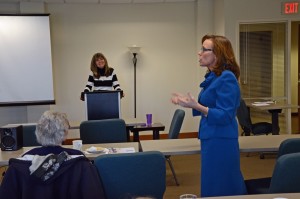Refuge for Women seeks home in McHenry County
Adela Crandell Durkee — January 25, 2016
State Rep. Barbara Wheeler (right) and Karen M. Schultz, city director for Refuge for Women, hosted an information meeting on human trafficking. (Photo by Adela Crandell Durkee/for Chronicle Media)
A Jan. 19 informational meeting at Loyola University Retreat and Ecology Campus in Woodstock brought attention to human trafficking.
During the meeting, State Rep. Barbara Wheeler (R-Crystal Lake), who hosted the event, told the disturbing story about a father, who lived in an affluent gated community, who sold his young girl to support his drug habit.
Wheeler went on to explain that often “young teens fall in love with a charming man, who turns out to be a pimp, or trafficker.”
Also attending the meeting was Karen M. Schultz, city director for Refuge for Women, an organization that aids women who have been victims of sexual exploitation and human trafficking.
The informational meetings included community employers, members of the religious community, donors, and anyone interested in helping bring the mission of Refuge for Women to the local area this spring and aid in funding their new facility.
“Human trafficking and sexual exploitation of women is a much more pervasive practice than many of us realize,” said Wheeler. “Unfortunately, even when a woman is able to escape her exploitation, the road to recovery and her ability to regain self-worth is not an easy one. Refuge for Women has a very successful program to help women recover, heal and find meaningful employment, but it takes a community to succeed.”
Wheeler and Schultz said the average age of a girl entering the $97 billion sex industry is 12 years old. The United States produces 89 percent of world’s pornography. One-third of runaways are with a trafficker within 48 hours of leaving home.
Wheeler said she first became conscious of the pervasiveness of human trafficking while working with representatives from Willow Creek. The presentation and compelling statistics spurred Wheeler to take up the gauntlet and become a cheerleader for the cause.
Currently, Refuge for Women has successful homes in Atlanta, south Florida, Kentucky, Las Vegas, and Chicago. According to Schultz, the current media attention on human trafficking created an increase in the rescue effort, so there are more rescue organizations than aftercare facilities. Ninety-four percent of the women, who complete the aftercare program, do not return to the sex industry. Instead, they finish college; they become gifted songwriters, vocalists, and businesswomen.
Refuge for Women will implement its 12-month, three-phase program for victims. The house in McHenry County will initially house four rescued women, and eventually, up to eight women. Refuge for Women hopes to find a house to renovate with local talent and donated labor. The home provides a safe place for residents to experience healing with few distractions. The key aspects of the Refuge for Women program are sobriety, healing from trauma, and rebuilding trust.
“Human trafficking affects 16-24 women living in this area,” said Wheeler.
Refuge for Women identifies Chicago as a trafficking hub, with I-90 as the pipeline between Chicago, Schaumberg, and Rockford. More than 400 online ads are posted every day. Schultz said,
“It’s a form of slavery,” said Schultz. “There are over 200 Asian spas in the area.”
She said that women have their papers taken away and forced to work and possibly live in spas.
“Many times these women have no money of their own,” she said.
Although the program is faith-based, the facilities are certified Recovery Dynamic facilities and the staff are trained and certified to implement the recovery dynamics material to assist with the recovery of substance abuse.
Refuge for Women houses only women seeking aftercare. Because some women have children or other family members, it becomes important to work hand-in-glove with other community outreach services. There are no restrictions to age, race, gender, or religious affiliation.
The program consists of three phases:
- Healing — 4 months. Refuge for Women works closely with each woman to heal any trauma from her past and helps her rebuild self-worth. Schultz says that women develop what’s referred to as trauma bond: a complexity cycle of kindness, manipulation, and violence. “One woman defined love as her ‘boyfriend’ buying her Cheetos to say sorry after beating her,” she said. She went on to explain that it takes a lot of unlearning.
- Job Prep — 3 months. Refuge for Women teaches assorted skills to equip every woman to enter the workplace with confidence and the ability to succeed and thrive.
- Employment — 2-5 months. Refuge for Women works closely with partner organizations and businesses to find women gainful employment that can supply their needs and the needs of their families. According to Wheeler, “It takes a community of dedicated people and funding to make this a reality.”
Although Refuge for Women is a faith-based organization, faith is not a requirement; no one is excluded. According to Schultz, they “hope to help women reconnect with dreams from their childhood.”
— Refuge for Women seeks home in McHenry County —







